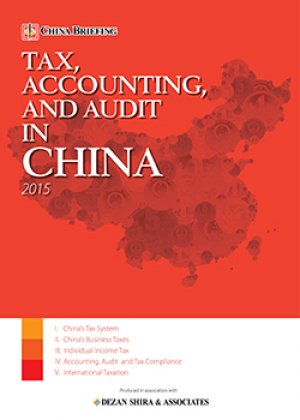China Regulatory Brief: China Commits to Automatic Exchange of Tax Information
China Commits to Automatic Exchange of Tax Information
Approved by the State Council, China has committed to the Organization for Economic Co-operation and Development’s (OECD’s) global standard for automatic exchange of tax information and will start to automatically exchange information with other countries’ tax authorities by September, 2018. On December 16, China became the 77th jurisdiction to sign the Multilateral Competent Authority Agreement (MCAA), a framework agreement based on the Multilateral Convention on Mutual Administrative Assistance in Tax Matters. Meanwhile, the OECD and China’s State Administration of Taxation (SAT) renewed a cooperation agreement first signed in 2013. This move indicates the country’s determination to combat global tax evasion through heightened international cooperation.
MOF Amends Measures for the Administration of Accounting Books
On December 11, the Ministry of Finance (MOF) issued the revised “Measures for Administration of Accounting Files (the Measures),” which shall become effective as of January 1, 2016. According to the Measures, the retention period for the relevant documents, including contracts, agreements, certificates and accounting books varies for different types of records (usually 10 or 30 years), and certain documents need to be stored permanently. The Measures also further clarified the definition and scope of accounting files, the administration of electronic accounting files and the rules of transferring the files abroad country. This is the first revision being made since 1998.
 RELATED: Tax and Compliance Services
RELATED: Tax and Compliance Services
Beijing Releases Implementation Rules of the Trade Union Law
The Beijing municipal government has recently released the “Implementation Rules of the Trade Union Law of the People’s Republic of China,” which will take effect on January 1, 2016. The rules stipulate that companies who have over 25 employees should set up a fundamental trade union. In the case that the company needs to lay off employees, the employer should inform the trade union 30 days in advance. Further, the company is required to fund the trade union based on two percent of the total wages paid to all their employees in last month before the 15th of each month. The employer may not prohibit their employees to join the trade union by means of terminating the labor contract or lowering payment.
China Further Clarifies Food Safety Law
On December 9, the State Food & Drugs Administration (SFDA) issued the revised draft of the “Implementation Regulations on Food Safety Law” to seek public opinions. Compared to current regulations, a total number of 64 new articles were added, with an emphasis on online food trading. According to the draft, the third party platforms are required to submit their website information and IP address to the SFDA within 30 working days after they start their online business. They also need to display the company information of food producers/retailers who have violated the food safety laws in a prominent place on their website.
|
Asia Briefing Ltd. is a subsidiary of Dezan Shira & Associates. Dezan Shira is a specialist foreign direct investment practice, providing corporate establishment, business advisory, tax advisory and compliance, accounting, payroll, due diligence and financial review services to multinationals investing in China, Hong Kong, India, Vietnam, Singapore and the rest of ASEAN. For further information, please email china@dezshira.com or visit www.dezshira.com. Stay up to date with the latest business and investment trends in Asia by subscribing to our complimentary update service featuring news, commentary and regulatory insight. |
![]()
 Tax, Accounting, and Audit in China 2015
Tax, Accounting, and Audit in China 2015
This edition of Tax, Accounting, and Audit in China, updated for 2015, offers a comprehensive overview of the major taxes foreign investors are likely to encounter when establishing or operating a business in China, as well as other tax-relevant obligations. This concise, detailed, yet pragmatic guide is ideal for CFOs, compliance officers and heads of accounting who must navigate the complex tax and accounting landscape in China in order to effectively manage and strategically plan their China operations.
Managing Your Accounting and Bookkeeping in China
In this issue of China Briefing, we discuss the difference between the International Financial Reporting Standards, and the accounting standards mandated by China’s Ministry of Finance. We also pay special attention to the role of foreign currency in accounting, both in remitting funds, and conversion. In an interview with Jenny Liao, Dezan Shira & Associates’ Senior Manager of Corporate Accounting Services in Shanghai, we outline some of the pros and cons of outsourcing one’s accounting function.
 Human Resources and Payroll in China 2015
Human Resources and Payroll in China 2015
This edition of Human Resources and Payroll in China, updated for 2015, provides a firm understanding of China’s laws and regulations related to human resources and payroll management – essential information for foreign investors looking to establish or already running a foreign-invested entity in China, local managers, and HR professionals needing to explain complex points of China’s labor policies.
- Previous Article China to Amend Its Patent Law
- Next Article China Regulatory Brief: Two-child Policy and China Advance Pricing Arrangement Annual Report











